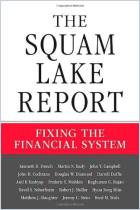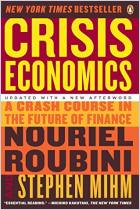Acesse a sua conta getAbstract para obter o resumo!

Acesse a sua conta getAbstract para obter o resumo!
The Squam Lake Group
The Squam Lake Report
Fixing the Financial System
Princeton UP, 2010
Sobre o que é?
What would happen if 15 renowned economists got together in one place? Ideas, lots of ideas
Recommendation
This slim volume is named after the isolated New England resort where 15 renowned economists, academics and policy makers met in the fall of 2008 to devise solutions to the “World Financial Crisis.” That they convened amid fast-paced, seismic economic events adds to the star-chamber aspects of their collaboration. Still, these éminences grises – all nonpartisan, without commercial sponsorship or political axes to grind – developed their ideas by sharing their expertise. Their recommendations cover reforms in banking, financial products, regulation, compensation, pensions and hedge funds – all the named villains of the last crisis. Why did they issue these ideas? So they could educate political and fiscal leaders – if they would only listen – about possible laws that could help avert or lessen the likelihood and impact of future meltdowns. getAbstract recommends this sound advice to students of and participants in the global economy.
Summary
About the Author
The Squam Lake Group is a non-partisan, non-affiliated group of academics who offer guidance on the reform of financial regulation. Dartmouth Professor Kenneth R. French coordinated 15 contributors, including former, current and future American Finance Association presidents; an ex-Federal Reserve governor; a former IMF chief economist and several former Clinton and Bush Council of Economic Advisers members. They are: Kenneth R. French, Martin N. Baily, John Y. Campbell, John H. Cochrane, Douglas W. Diamond, Darrell Duffie, Anil K. Kashyap, Frederic S. Mishkin, Raghuram G. Rajan, David S. Scharfstein, Robert J. Shiller, Hyun Song Shin, Matthew J. Slaughter, Jeremy C. Stein and René M. Stulz.




















Comment on this summary
And lets not forget that the "crazy" financial instruments blamed for the crash were the simply result of lose-cannon monetary policy by the FED with controlled interest rates and their moves through the 2000s. These instruments were far from the cause but actually an attempt by the market to 'soak up' all the mess the fed was making. Many of the "intellectuals" introduced here and throughout need to quit playing 'god' and learn to teach individual responsibility (including to the the banks and government leaders).
I strongly believe that there is a need for regulation (what is the state for if not for this?). And also, that there can be too much of it. The hard thing about national or global economy is to find the narrow path that is successful, and that it will change over time as society, demography etc. change.